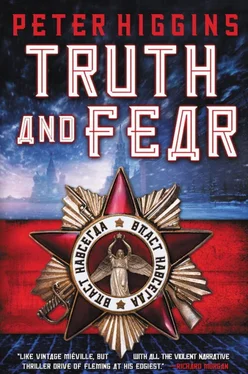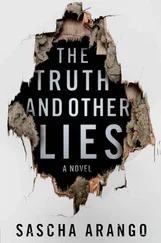When the track made long sweeping curves Maroussia could see the rest of the train. There were two armoured engines at the front and two huge guns, each on its own heavy truck, one behind the engines and one at the very back. Long barrels canted to the sky. Four more wagons with thick steel plating lined with firing slits carried gun turrets. The bulk of the train was unmarked freight wagons and a dozen passenger cars, looking tiny and incongruous in the Edelfeld-Sparre purple. Between the turreted fighting cars and the freight wagons was a specially widened truck which carried a shapeless bulk, high and wide as a house, shrouded in pale grey camouflage sheeting.
She knew what it was. She could feel its presence. The Pollandore. She tried to reach out towards it with her mind. There was nothing. No response. On a ledge at the front of the Pollandore’s truck a mudjhik stood, motionless and sentinel.
The train seemed to be going east, as far as Maroussia could tell, and perhaps a little north. Sometimes they roared along at speed, sometimes they slowed to a crawl, little more than walking pace. Occasionally the train would halt, never in a station but always in a deserted siding or marshalling yard, some with a surrounding cape of township. Maroussia drank in the names when she could see them, and pinned them to her memory, though they meant nothing to her. Ortelsvod. Thabiau. Sarmlovsk. Novimark. Bolland. Malovatisk. Ansk. She tried to see who came and went from the train. Figures passed in and out of view in early mist or evening darkness. People must have seen her face at the lit carriage window but nobody came near.
On the second day out of Mirgorod, shortly after dawn, the train came to a long shuddering stop with a screaming of brakes and the guns began to fire. The turret muzzles rattled viciously and the big ordnance boomed salvoes. The whole train shifted in the tracks with the recoils. Her face pressed tight against the window bars, Maroussia could see muzzle flashes and drifts of black smoke, but what they were firing at she had no idea. After fifteen minutes or so the firing ceased, but it was several hours before the train moved on.
Time divided itself between periods of trees and periods of lakes. The trees were needle-leaved spars of spruce and pine rising from a carpet of moss. The lakes were leaden grey interludes in a featureless plain of sandy scrub and grass. Flat horizons deadened all sense of forward motion. Days and nights merged one into another.
And then one morning Chazia came to Maroussia’s compartment. She looked drained. Exhausted. She filled the compartment with sour staleness and sweat. She sat on the opposite bench under the mirror, swung her legs up onto the seat, and stared at Maroussia. Her pale reddened eyes were unnaturally wide and bright, the skin of her face pallid, grey and dry. She curled up her legs on the seat, cosy and intimate.
‘Are you comfortable, darling?’ she said. ‘Are you sleeping? It must be tedious for you to be so much alone. I will send you books.’
Chazia shifted restlessly in the seat, scratching at the dark patches on her arms and hands, tugging at the skin of her cheek. She was holding the solm of twigs and wax and stuff gently, like something delicate and precious, but in her hand it looked drab and stupid. A bunch of litter. Dead.
‘This little thing,’ said Chazia. ‘It’s so fragile. See? You could stick in your thumb and break it apart. It’s ephemeral. We need to be quick.’
She winced and scratched vigorously at the skin on the inside of her elbow. There were scabs and wound tracks there. A little fresh blood was oozing. She saw Maroussia looking and smeared the blood away.
‘See what it’s doing to me?’ she said. ‘It’s making the ants worse. Tiny awful ants. You can’t see them, they’re too small, but they’re there under my skin and I can’t get them out. The forest put them there. I went too near the trees at Vig. They’re in my arms now, but the face is worse. I can’t sleep then. Not at all.’ She stopped scratching and looked at Maroussia. Her blue eyes were hot and sore. ‘You can’t destroy the angel, Maroussia. It isn’t destructible. It’s too strong. It’s beautiful. It spoke to me once, at Vig, and it will speak to me again.’
‘Where’s this train going?’ said Maroussia.
‘Novaya Zima,’ said Chazia. ‘I told you.’
‘I don’t know where that is.’
Chazia gestured vaguely. ‘North.’
‘We’re not going north.’
‘Not yet. We’ll turn north when we can.’
‘There was shooting yesterday,’ said Maroussia. ‘Was that the Archipelago? Are you losing the war?’
‘Losing it?’ said Chazia. ‘Of course we can’t lose it. The war is good. It is history in action. The old Vlast was stale and tired. Silted up with careerists. They had no energy. No purpose. No imagination. The Archipelago will clear all that away for us. They want Mirgorod? So? Let them have it. Mirgorod is not the Vlast. Mirgorod is one city, yesterday’s city. Let them have it. The Archipelago will consume our corruption like maggots in a wound, and for now we let them do their work, and when they have finished we’ll brush them away.’
‘What if their armies follow you east?’ said Maroussia.
‘At the time of my choosing I will destroy them,’ said Chazia. ‘All their armies will count for nothing. They will burn, they will all burn, and the winds of their burning will blow the ashes of the Archipelago from the face of the planet.’
As she talked she was turning the solm over and over in her hands, looking at it from every direction. Cupping it protectively. Holding it up to her face.
‘It doesn’t do anything,’ said Chazia. ‘Nothing at all.’
Maroussia felt something moving inside her head. A surreptitious, intrusive touch, like careful fingers probing gently, cool and sly. A secretive violation. It made her feel dizzy and sick.
‘What are you doing to me?’ she said.
Chazia looked up from the solm.
‘You were going to use this,’ said Chazia, ‘against the Vlast. Against the angel. Against me. You thought you were going to change the world. You thought you could free the planet of angels by the deed of your own hand. You thought you’d got some kind of hero’s task.’
‘No—’
‘It is an interesting form of individualistic delusion. One person does not change the world. History is huge, colossal, unturnable. Look at me. I am building a new, better, cleaner Vlast. By my own efforts I will do this. But I don’t think I’m a hero. I know I am not. I reject the concept. I am a conduit, a facilitator. I ride the wave of history but the wave has its own momentum and I go this way because it is inevitable. If I turn aside and try to find my own independent path I will certainly be destroyed. The world is as it is and will be as it will be.’
‘Everyone makes their own world,’ said Maroussia. ‘I will do what I have chosen to do. Because I have chosen. Even if what I do makes no difference to anyone but myself, I’ll still have done something that matters .’
Again Maroussia felt faint sickening touches inside her mind. Needle probes and clumsy fingers grubbing around. She tried to focus on what was happening but could not.
‘But that is such rubbish, sweetness. Can’t you hear yourself? Absolute shit. Did you choose the Pollandore, or did it choose you? You don’t know anything about what you’re dealing with, except what the people in the forest have told you. You’re a move in a game, that’s all. Someone else’s game.’
‘No!’
‘So what is the Pollandore? What does it do? What is it for? Can you tell me?’
‘Take this chain off my leg,’ said Maroussia.
Chazia laughed.
‘You’re stubborn,’ she said. ‘Determined. I understand what Lom sees in you.’
Читать дальше


![Кэмерон Доки - Правда и ее последствия[Truth and Consequences]](/books/79610/kemeron-doki-pravda-i-ee-posledstviya-truth-and-con-thumb.webp)









